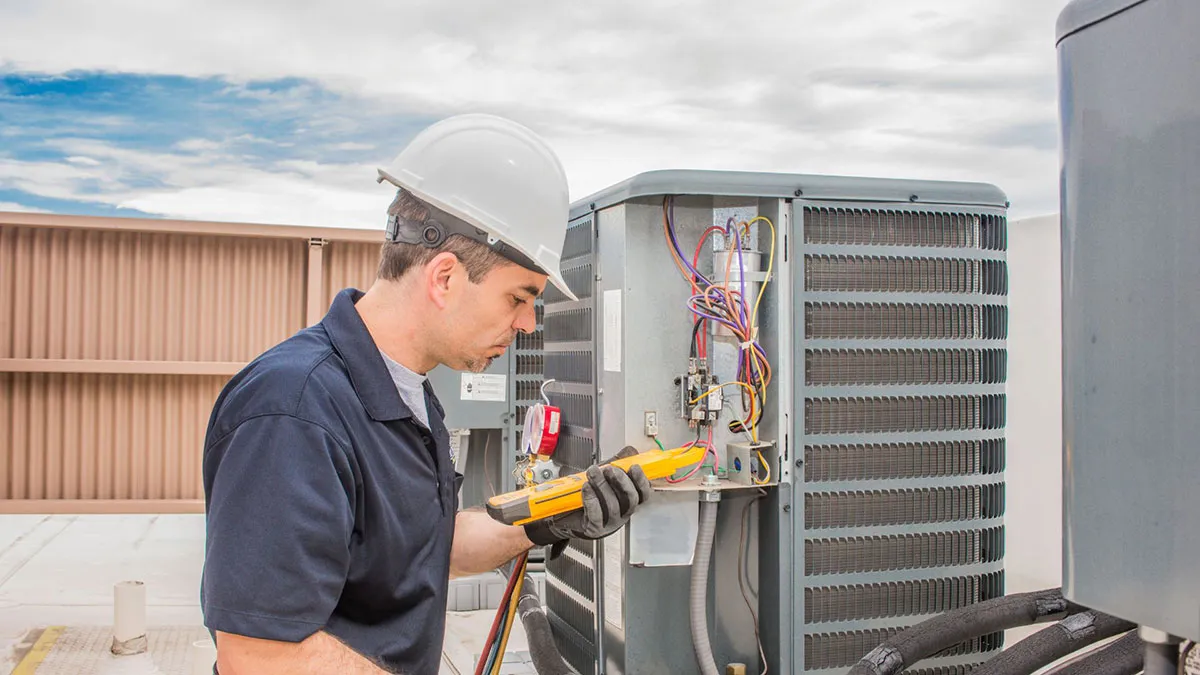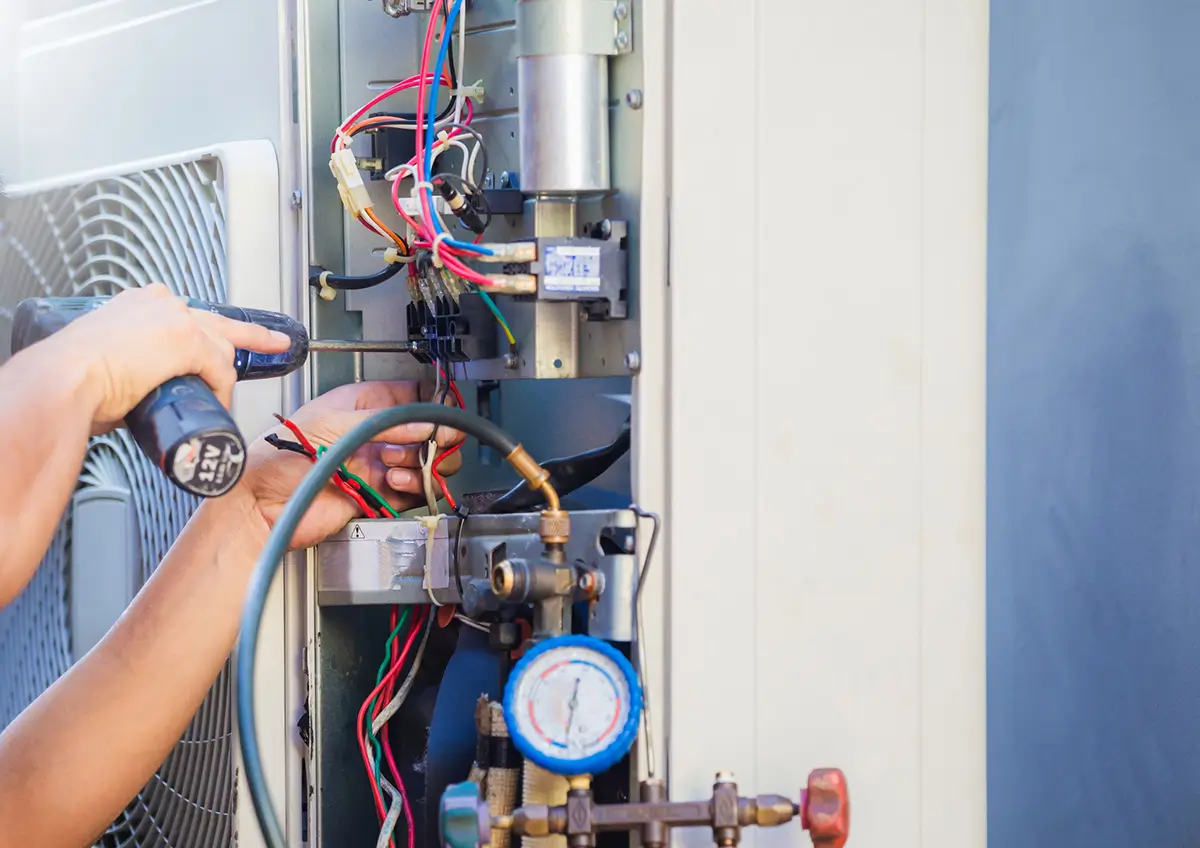In Hawaii’s warm climate, your AC is crucial for comfort, so when it starts acting more like a heater, it’s not just inconvenient—it’s a call to action. Here, we will dive into the common malfunctions that cause your AC to blow hot air. From understanding these issues to providing troubleshooting tips, we aim to empower you with knowledge.
We’ll also discuss when it’s time to call in the professionals and why regular AC maintenance is essential in keeping your Hawaiian home cool and comfortable. Join us as we unravel the causes behind this hot air dilemma and provide practical solutions to keep your living space the oasis it should be.
AC Malfunctions that Cause the Blowing of Hot Air
When your air conditioning system begins expelling warm air amidst the Hawaiian heat, it serves as an unmistakable indicator that something is awry. Let’s explore the heart of each common malfunction and their associated symptoms:
Thermostat Setting Issues
The Problem: Sometimes the issue is as simple as incorrect settings on the thermostat. An accidental switch to ‘heat’ mode or an incorrectly set temperature can cause the AC to blow hot air.
Symptoms: The AC is operational, but the air it blows feels warm or hot. The system responds to thermostat adjustments but doesn’t cool as expected.
Low Refrigerant Levels
The Problem: Refrigerant plays a critical role in extracting heat from the surrounding air. Low levels due to leaks or other issues mean the AC can’t cool effectively.
Symptoms: Ice formation on the refrigerant lines, hissing noises from the AC unit, and a noticeable decrease in cooling efficiency.
Dirty Air Filters
The Problem: Air filters clogged with dust and debris restrict airflow, hindering the AC’s ability to cool air properly.
Symptoms: Reduced airflow from vents, more frequent cycling of the AC unit, and warm air output.
Faulty Compressor
The Problem: The compressor serves as the central component in the air conditioner’s cooling system. If it fails, the whole system’s ability to cool air is compromised.
Symptoms: The outdoor unit vibrates or makes unusual noises, the AC struggles to start, or it blows warm air.
Blocked or Dirty Condenser Coils
The Problem: The condenser coils in the outdoor unit expel heat from the home. If they’re dirty or blocked, this process is hindered.
Symptoms: The exterior unit feels excessively hot, the system overheats and shuts off, or it blows warm air.
Leaking Ductwork
The Problem: Duct leaks can allow cooled air to escape and warm air from unconditioned spaces to enter the system.
Symptoms: Inconsistent temperatures in different rooms, higher energy bills, and warm air coming from vents.
Electrical Problems
The Problem: Issues with electrical components like the capacitor or relays can affect the AC’s ability to cool air.
Symptoms: The AC may not turn on, may frequently turn off, or blow warm air intermittently.
Malfunctioning Thermostat Sensor
The Problem: A faulty thermostat sensor may inaccurately read the room’s temperature, causing improper functioning of the AC.
Symptoms: The AC cycles too frequently or blows warm air despite cool settings.
Frozen Evaporator Coils
The Problem: Coils that freeze over cannot effectively transfer heat, leading to warm air being circulated.
Symptoms: Ice buildup on the indoor unit, decreased airflow, and warm air output.
Improperly Sized AC Unit
The Problem: An AC unit that is too big or too small for a space can lead to inefficient cooling and warm air blowing.
Symptoms: Short cycling of the AC unit, inconsistent cooling, and periods of warm air blowing.
Understanding these malfunctions and recognizing their symptoms is the first step in addressing your AC’s issues. In the following sections, we will guide you through troubleshooting these problems and discuss the importance of professional intervention for more complex issues.
Troubleshooting for AC Malfunctions
After identifying the common malfunctions that can cause your AC to blow hot air, the next step is troubleshooting. These initial diagnostics can often help you resolve simpler issues or better understand when to call in the professionals.
Assessing Thermostat Settings:
Verify the Mode: Make sure your thermostat is configured for ‘cool’ mode rather than ‘heat’ or ‘fan only.’ This simple missetting is a frequent and easily overlooked culprit.
Temperature Settings: Confirm that the temperature setting is set lower than the current room temperature. This ensures the AC triggers the cooling cycle.
Inspecting for Low Refrigerant Levels:
Visual Inspection: Look for signs of refrigerant leaks, such as oil spots near the AC connections or ice buildup on the refrigerant lines.
Professional Help: If you suspect a refrigerant issue, it’s time to call a professional, as handling refrigerant requires expertise and specific tools.
Checking and Replacing Air Filters:
Filter Inspection: Remove and inspect the air filter. If it appears visibly soiled or obstructed, it should be either cleaned or replaced.
Regular Replacement: As a precautionary step, consider changing or cleaning air filters every 1-3 months, adjusting the frequency based on your usage and the environmental conditions in Hawaii.
Evaluating the Compressor:
Listen for Irregular Noises: Unusual noises from the outdoor unit can indicate compressor problems.
Observe the Unit: If the compressor doesn’t start, or continuously starts and stops, professional assessment is advised.
Cleaning Condenser Coils:
Coil Inspection: Check the outdoor unit’s coils for dirt and debris.
Gentle Cleaning: You have the option to use a garden hose to clean the coils once you’ve turned off the power to the unit. Avoid using high pressure, which can damage the coils.
Investigating Ductwork for Leaks:
Visual Inspection: Look for obvious tears or disconnects in exposed ductwork.
Feeling for Air Leaks: With the AC running, feel along the ducts for air escaping. Duct tape can temporarily seal small leaks, but larger issues will need professional repair.
Checking Electrical Components:
Circuit Breaker: Ensure the AC’s circuit breaker hasn’t tripped. If it has, reset it once and monitor if it trips again.
Visible Inspection: Check for any visible signs of electrical issues like burnt wires or components. Do not touch or attempt DIY repairs on electrical parts.
Testing Thermostat Sensor:
Sensor Position: Ensure the thermostat sensor isn’t touching any other components, as this can affect its reading.
Recalibration: Some thermostats can be recalibrated following the manufacturer’s instructions. Nevertheless, when in uncertainty, it’s recommended to seek professional assistance.
Addressing Frozen Evaporator Coils:
Thawing the Coils: If you notice ice, turn off the AC and run the fan to help thaw the coils.
Professional Inspection: Frozen coils can indicate bigger issues like low refrigerant or airflow problems, which may require professional attention.
Evaluating AC Unit Size:
Professional Assessment: If you suspect your AC unit is improperly sized for your space, consult with an AC professional. They can offer a precise evaluation and suggest appropriate solutions.
Remember, while these troubleshooting steps can resolve some common issues, certain malfunctions, especially those related to refrigerants, electrical components, and system sizing, require the expertise of a professional. Attempting to fix these complex problems on your own can be unsafe and may lead to more significant issues.
When to Call the Professionals
While troubleshooting can often resolve common AC issues, there are situations where the expertise of a professional is crucial. Knowing when to call in experts like Steve’s Plumbing & AC Service is key to ensuring the safety and longevity of your AC system, especially in Hawaii’s climate.
Persistent Issues After Troubleshooting:
If you’ve followed the troubleshooting steps and the problem persists, or if the AC continues to blow hot air, it’s time to seek professional help. Recurring issues often signal deeper malfunctions that require specialized knowledge and tools.
Refrigerant Handling and Recharging:
Refrigerant issues should always be addressed by professionals. Handling refrigerant requires certification and expertise due to its hazardous nature. If your troubleshooting points to a refrigerant problem, professional service is non-negotiable.
Electrical Component Failures:
Electrical issues in an AC unit can be complex and dangerous. If you suspect a problem with the electrical components, such as frequent circuit breaker trips or visible wire damage, a professional technician should safely address these concerns.
Complex System Diagnostics:
Professionals have the tools to conduct comprehensive diagnostics. If your AC system is exhibiting confusing symptoms or multiple problems, a professional can accurately diagnose and fix the root cause.
Potential Ductwork Problems:
Issues like significant duct leaks, poor installation, or extensive damage within the duct system require a professional’s attention. Inadequately addressed ductwork can result in inefficiency, increased energy expenses, and compromised air quality.
AC Unit Sizing and Replacement:
If your AC unit is incorrectly sized for your space, as suggested by persistent inefficiency or short cycling, professional advice is needed. Experts can assess and recommend the appropriate size and, if necessary, handle the installation of a new unit.
When Safety is a Concern:
Whenever you harbor doubts about the safety of conducting repairs or maintenance, it’s advisable to seek the expertise of professionals. This includes situations where you’re dealing with high voltage, unfamiliar parts, or anything beyond your comfort level.
In Hawaii, where your AC is essential year-round, ensuring its proper functioning is vital. Steve’s Plumbing & AC Service is equipped to handle all your AC concerns, from routine maintenance to complex repairs, ensuring your home remains the cool retreat you cherish.
The Importance of Regular Professional AC Maintenance
In the Hawaiian islands, where the rhythm of life is harmoniously intertwined with the climate, the role of regular professional AC maintenance stands as a crucial element in your home’s harmony. This section highlights why consistent professional care is not just beneficial but essential for your AC system.
Tropical Climate Adaptation:
Hawaii’s unique climate puts distinct demands on AC systems. Regular professional maintenance ensures your system is adapted and optimized for these conditions. It’s about more than just function; it’s about tailoring your AC to thrive in Hawaii’s specific environment.
Prolonging AC Lifespan:
The longevity of your AC unit is significantly enhanced with professional upkeep. Regular checks and tune-ups can catch minor issues before they escalate into major repairs, much like nurturing a tropical garden to ensure its year-round splendor.
Enhancing Energy Efficiency:
Professional maintenance is key to keeping your AC unit running at peak efficiency. In a land where energy conservation is intertwined with natural beauty, ensuring your AC unit uses energy wisely is a tribute to both your comfort and environmental responsibility.
Expert Insight and Preventative Care:
Skilled technicians bring a wealth of insight to each maintenance session. Their expertise allows them to foresee potential issues and provide preventative care, much like a seasoned navigator reading the sea and sky to chart the best course.
Customized Solutions for Island Living:
Every Hawaiian residence comes with its own distinct appeal and set of obstacles. Professional AC service offers customized solutions that fit not just the technical specifications but also the personality of your home and lifestyle.
Peace of Mind:
Regular professional maintenance offers peace of mind. Knowing that your AC system is cared for by experts allows you to relax and enjoy the island life without the worry of unexpected breakdowns.
In Hawaii, where the air conditioner is a silent guardian of your indoor comfort, entrusting its care to professionals like those at Steve’s Plumbing & AC Service is a decision that resonates with the wisdom of island living. It’s a partnership that ensures your home remains a cool haven amidst the tropical warmth.
Keep Your Hawaiian Home Comfortable with Steve’s Plumbing & AC Service
As we conclude our journey through understanding and addressing AC malfunctions, remember that the key to a cool and comfortable home in Hawaii lies in expert care and maintenance. At Steve’s Plumbing & AC Service, we’re dedicated to providing you with top-notch AC repair, maintenance, and installation services.
Why Choose Steve’s Plumbing & AC Service?
- Comprehensive Services: Whether you need a routine check-up, an urgent repair, or a brand-new installation, our team has the skills and experience to handle it all.
- Tailored to Hawaii: We understand the unique challenges of maintaining AC systems in Hawaii’s climate and offer solutions that are specifically tailored to meet these needs.
- Reliability and Expertise: Our commitment to quality service and customer satisfaction ensures that your AC system is in good hands.
Don’t let AC issues disrupt your island lifestyle. Trust Steve’s Plumbing & AC Service to keep your home the comfortable oasis it should be, all year round.
Ready for Reliable AC Services? Contact us today at (808) 563-4054. Let Steve’s Plumbing & AC Service be your partner in maintaining the perfect climate in your Hawaiian home.











